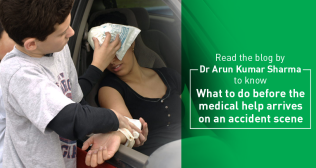
The Emergency experience: Navigating the space between order and chaos
Its 2A.M. on a cold winter’s night, and you wake up with a sharp pain in your chest and drenched in sweat. You recollect last night’s scrumptious meal at your best friend’s birthday bash. You pop in an antacid and get back into bed hoping it’s just ‘acidity’. But the pain worsens, and that’s when you think to yourself, ‘Could this be something else?’. That’s when you rush to the ER (Emergency Room).
The ER is a melting pot of numerous symptoms and diseases. In emergency medicine, we get to see a huge variety of disease and varied presentations of varied disease. No other speciality in medicine or surgery, get to see the variety of conditions that an emergency physician sees in a day or week.
We deal with Road traffic accidents, cardiac arrest, burns, poisoning/overdoses, animal bites, abdominal pain, unconsciousness, allergic reactions, asthma attacks and oncological emergencies to name a few.
Hence, visiting an ER in a tertiary care hospital can sometimes be a frustrating and traumatic experience for some. For the patient who has a life-threatening condition, prompt treatment and interventions are never delayed, and he/she seldom must wait for things to happen. It’s like how it happens in the movies, where a patient is brought in unresponsive on a stretcher, and suddenly you see a bunch of healthcare providers rush to the bedside of the patient, and frantically start to resuscitate the patient.
But it doesn’t always work this way for each patient, especially for someone who walks into the ER. This is where ‘triaging’ comes into play. Every ER has a triaging area and a triaging nurse/doctor, who assesses the patient and determines how sick he/she is. It includes taking your Pulse, Blood Pressure, Sugar levels, ECG and enquiring regarding your current problem.
An Emergency physician assesses and examines you, and determines what’s ailing you, or creates a list of possible causes for your symptoms. This a differential diagnosis, and the most likely diagnosis is determined by a complete physical examination or certain diagnostic tests. The Emergency physician may provide immediate medication or interventions to address your current symptoms.
So, the chest pain which woke you up in the middle of the night could be just harmless ‘acidity’ or an impending cardiac problem. This is where a well-trained & qualified Emergency Physician comes to the aid of the patient. Certain symptoms & signs are like an alarm bell given out by the body and require immediate attention & action. It’s the emergency physician who reads the ECG and assesses the patient and determines whether to involve the cardiologist or gastroenterologist.
Emergency medicine (EM) is a nascent speciality in India that was recognized by MCI in 2009. There are now recognized 3-year postgraduate courses in EM which are being run in govt & private medical colleges and in private hospitals in India.
The Supreme Court of India in 1996, ruled that the failure to provide timely medical treatment to a person in need of such treatment results in a violation of his/her “right to life” guaranteed under Article 21 of the constitution.
The National Public Hearing on the ‘Right to Health Care’ organized by the National Human Rights Commission (NHRC) and the Jana Swasthya Abhiyan (JSA) at New Delhi on 16 and 17 December 2004, emphasized that people's access to emergency medical care is an important facet of right to health. (NHRC, 2004)
The National Health Policy (2017) envisages creation of a unified emergency response system, linked to a dedicated universal access number (112), with network of emergency care that has an assured provision of life support ambulances, trauma management centres.
India has awakened to the need for developed emergency medical systems & care, but these delivery systems need to penetrate both urban & rural areas.
According to a recent diktat of the Medical Council of India (MCI), all medical colleges must be equipped with fully functional emergency departments by March 31, 2022, failing which their courses will not get the required sanction.
With MCI stipulating all medical colleges seeking ‘letter of permission’ for MBBS batch of 2022-23 get fully functional emergency departments, undergraduate and postgraduate students are likely to get adequate training in handling emergency, trauma and accident cases. (TOI, Bengaluru, Nov. 20,2019)
Subsequently, in a busy & chaotic ER, a patient can always look forward to an emergency physician to not only treat them, but help them navigate the system, assure an anxious patient, assuage a grieving family member & go above & beyond his/her duty.
Categories
Clear allMeet the doctor

- Emergency and Trauma | Emergency Medicine
-
10 Years
-
1300















